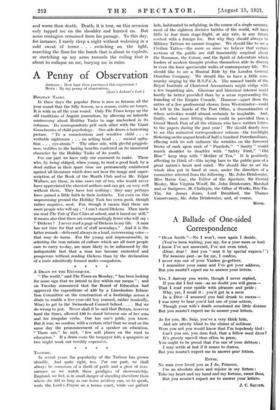A Penny of Observation
ARMADO : How haat thou purchased this experience ? Mom: By my penny of observation. (Love's Labour's Lost.)
HOLIDAY TASKS.
In these days the popular Press is now so fatuous all the year round that the Silly Season, as a season, exists no longer. It is with us all the year round. Only The Times keeps up the old traditions of August journalism, by allowing an infantile controversy about Holiday Tasks to rage unchecked in its columns. Its correspondents pelt each other with the Giant Gooseberries of child-psychology. One side draws a harrowing picture. "To a conscientious and sensitive child . . . a veritable nightmare. . . an aching head. . . mental agita- tion . . . eye-strain." The other side, with gleeful priggish- ness, testifies to the lasting benefits conferred on its unnatural character by the Holiday Tasks of its youth.
For our part we have only one comment to make. Those who, by being obliged, when young, to read a good book by a dead author in their spare time are permanently embittered against all literature which does not bear the image and super- scription of the Book of the Month Club and/or Mr. Edgar Wallace, are those, in nine cases out of ten, who would never have appreciated the classical authors and can get on very well without them. They have lost nothing ; they may perhaps have gained a little faith in their instincts. Yet even on this unpromising ground the Holiday Task has sown good, though rather negative, seed. For, though it means that there are more people who will say : " I can't stand Dickens. Then made me read The Tale of Two Cities at school, and it bored me stiff," it means also that there are correspondingly fewer who will say :
Dickens ? I never read a page of Dickens in my life. A man has not time for that sort of stuff nowadays." And it is the latter remark—delivered always in a loud, overweening voice— that may do harm. For the young and impressionable, in selecting the iron rations of culture which are all most people care to carry to-day, are more likely to be influenced by the indisputable fact that a man has become contented and prosperous without reading Dickens than by the declaration of a taste admittedly formed under compulsion.






























 Previous page
Previous page